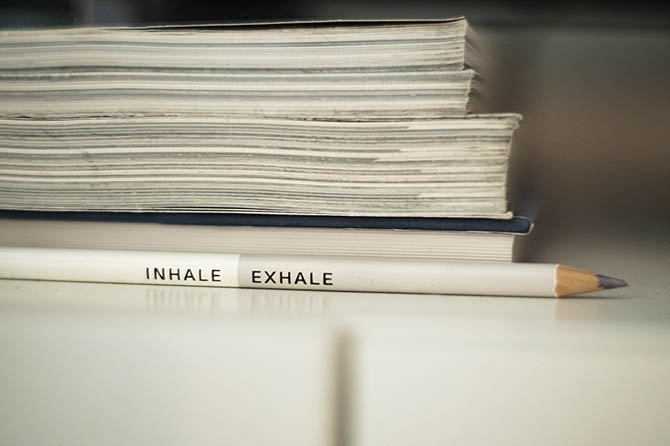It’s natural to feel nervous before an important event. However, when those nerves escalate into overwhelming waves of anxiety, it can be difficult to keep them under control. It’s when you find yourself losing sleep, obsessing over details, overthinking, or feeling like a bundle of nerves before an event. Whether it’s a presentation at work, a job interview, a performance, or a first date, pre-event jitters can fill you with dread, make it hard to focus, and drain your confidence.
The pressure to perform and succeed can feel overwhelming, and it’s easy to get caught up in thoughts of what could go wrong. But the good news is that you don’t have to let anxiety hold you back. Let’s explore some practical tips and strategies to stop worrying, calm your nerves, reduce stress, and cope with anxiety before an important event. Take a deep breath and let’s dive in.
Shift Your Thinking: Anxiety Is Not Your Enemy
Tune Into Your Feelings and Share Your Worries
Tame Your Anxious Thoughts and Give Yourself a Love Boost
Imagine Handling Challenges You’re Worried About
Shift Your Thinking: Anxiety Is Not Your Enemy
Your level of anxiety can largely depend on how you perceive your pre-event stress. If you resist or fight against anxiety and try to make it go away, it can actually intensify your feelings of nervousness and worry. However, if you learn to accept your anxiety and view it as a natural response to a challenging situation, you can reduce its intensity and manage it more effectively.
We often see the physical symptoms of anxiety, such as sweating, trembling, or rapid heartbeat, as something to be avoided. These sensations are definitely uncomfortable, but they are a natural response to stress – your body is preparing you to stay focused, alert, and engaged. It’s completely normal to worry and feel nervous before an important event, and can handle your anxiety without having to avoid or resist it.
Anxiety Can Help You Perform Better
It’s easy to assume that anxiety always has a negative impact on performance. However, research suggests that this isn’t always the case. In fact, some level of adrenaline and cortisol can even help you perform better, as long as it doesn’t get out of control and is handled properly. The 2017 study found that people who acknowledged and accepted their anxiety, rather than trying to suppress it, were better able to devote their energy to their goals and to use their stress as a source of motivation, which led to positive outcomes such as academic achievement, persistence, and job satisfaction.
So, if you’re feeling anxious and can’t stop worrying before a presentation, public speaking, exam, job interview, or performance, try to shift your thinking and see your worries and anxious sensations as normal, natural, and bearable. Embrace your stress as a natural and normal part of the experience. Rather than viewing anxiety as a threat, try to approach it as a challenge that you’re capable of handling. It’s uncomfortable, but with the right mindset and strategies, you can handle it. Even more, you can actually use your anxiety to your advantage and turn it into a tool to energize you and enhance your performance.
Breathe Yourself to Calm

You’ve probably heard the advice to take a deep breath when you’re feeling anxious, but have you ever wondered why it works?
Breathing is something we do without even thinking about it, but when we’re stressed, our breath can become shallow and rapid, which can further increase our feelings of nervousness and worry. By focusing on our breath, slowing down and deepening it, we activate the parasympathetic nervous system, which helps us feel more centered and calm.
So, how do you slow down your breath and activate your relaxation response?
One simple technique is to make your exhale longer than your inhale. You can try inhaling though the nose for a count of four, and then exhaling through the mouth for a count of six or eight. Puffing your cheeks out or pursing your lips while exhaling can also help to slow down your breath and extend your exhale. This slower, more deliberate breathing sends a signal to your brain that everything is okay, which can help reduce your feelings of anxiety and stress.
To counteract the shallow breathing pattern that comes with anxiety, try breathing deeply into your belly. Notice how your belly inflates as you inhale and deflates as you exhale. When you breathe out, imagine your breath flowing out from your belly and slowly releasing tension and anxiety from your body.
It’s helpful to learn some simple controlled breathing techniques for anxiety, like Box breathing or 4-7-8 breathing, and to practice them regularly so that you’re prepared to use them when you need to steady yourself before an important event. These techniques can also help you mindfully focus on your breath and distract you from anxious thoughts.
Breathing exercises can not only help to relieve stress and anxiety before a presentation, public speaking event, or performance, but they can also help to improve your voice control and projection, allowing you to communicate more effectively and confidently.
Breathing is a simple natural de-stress tool that you always have with you and can use anywhere and anytime you need it. So, learn to use this tool effectively and keep it handy for those moments when stress strikes.
Address the Stress in the Body

Anxiety isn’t just a mental experience; it also has a powerful physical effect on our bodies. When you’re feeling anxious, your body’s natural stress response kicks in and causes a cascade of physical changes such as heart racing, shallow breathing, and tense muscles. Your body gets into fight or flight mode, even though there’s no real danger around, and it’s just a presentation. These changes can leave us feeling physically uncomfortable and overwhelmed, so it’s important and helpful to address the physical aspect of anxiety and try out some somatic strategies to help calm down your body’s stress response and make yourself feel more comfortable.
Here are a few simple techniques you can use to regulate your body’s response to stress:
Plunge into cold water
Taking a cold shower, washing your face with cold water, or simply running cold water over your hands can help activate your body’s relaxation response. The shock of the cold water triggers the release of endorphins and stimulates the vagus nerve, helping to regulate your heart rate, breathing, and overall relaxation response.
Ground yourself
When you’re feeling anxious, it can be helpful to bring your attention back to your body and the present moment. One way to do this is to focus on the sensations in your feet as they make contact with the ground. You can also try pressing your feet firmly into the floor or earth, imagining roots growing from your feet into the ground. As you do this, you can also try taking a few deep breaths while paying attention to the sensation of your breath moving in and out of your body. Learn more grounding techniques.
Engage with your senses
Our senses have a powerful impact on our emotions and can be used to regulate stress. Activating the senses of touch, taste, smell, sound, and sight, can help you shift your focus away from anxious thoughts and into the present moment. For example, you can touch a textured object, such as a stress ball or a piece of fabric. Or focus on the sounds around you, such as the rustling of leaves or the hum of a fan. You can smell a citrus scent, such as lemon, lime, or orange, which has been found to have mood-boosting and stress-reducing effects. You can carry your favorite essential oil or a small object with a comforting texture, taste, or color, and use it to engage your senses whenever you’re feeling anxious.
Tense and relax your muscles
Progressive muscle relaxation, which involves intentionally tensing and then relaxing different muscle groups in your body, can help release physical tension and help you relax. You can start with your toes and work your way up to your head, tensing each muscle group for 5-10 seconds before releasing.
Redirect and refocus the anxious energy
Sometimes, the best way to manage anxiety is to channel that nervous energy into a physical activity. Exercise, jumping jacks, or dancing are all great ways to release pent-up energy and promote relaxation. Simply shaking your body or stretching can also help release tension. Give your body some freedom and help it use that nervous energy constructively. Try to find an activity that you enjoy and that feels good for your body.
Take a walk
Walking is a great way to regulate the body’s stress response. It can help get your blood flowing and release tension in your muscles. Going for a walk in nature, in particular, has been found to have mood-enhancing and stress-reducing effects, so find a nearby park or green space to explore. As you walk, engage your senses by noticing the sights, sounds, and smells around you. Walking can also help boost dopamine levels, which can promote feelings of pleasure and well-being.
We’re all unique, our bodies respond differently to stress, and what works for one person might not work for another. So, it’s worth trying different techniques to find out what works best for you. By learning to reconnect with your body and using some simple somatic strategies, you might be able to ease your anxiety and find some chill vibes even in the midst of worrying.

Tune Into Your Feelings and Share Your Worries

Bottling up your feelings and worries can make anxiety worse. Instead, try bouncing them off someone you trust, like a friend, family member, or colleagues. Sometimes just saying out loud, “I’m feeling anxious” can bring relief.
By sharing your concerns with others, you might gain a new perspective, get helpful feedback, or simply feel heard and understood. Talking about your emotions can also help you process them and gain insight into what triggers your anxiety.
So don’t hesitate to reach out to someone you trust when you’re feeling overwhelmed and can’t stop worrying. They might not have all the answers, but they can provide a listening ear and a supportive presence, which can go a long way in managing stress and anxiety.
Tame Your Anxious Thoughts and Give Yourself a Love Boost

One way to manage pre-event jitters is through addressing your self-talk. Before an important presentation, public speaking engagement, performance, or any other exciting but threatening event, you might be swamped with anxious thoughts like “It’s going to be a disaster,” “I’m so stressed,” “I’m freaking out,” or “I’ll be so awkward.” This will hardly help you deal with your nerves. Instead of giving yourself hard time by negative self-talk, take a few minutes to remind yourself of why you’re doing this and why it’s important for you. What are your goals for this event? What can you learn from this experience? How can it contribute to your growth? Try to focus on what motivates and inspires you. It can be a game-changer for your mindset.
Give yourself a nice, self-compassionate pep talk. You don’t have to be all, “I’m amazing and nothing can stop me!” if it doesn’t feel authentic and true to your situation (although, hey, if that works for you, go for it). You can focus on a more balanced perspective. Just try to be kind to yourself and remind yourself of the good things. Maybe something like, “I’m a little nervous, but I’m also really excited to see what happens. I’ve prepared as best I can and I’m ready to tackle this challenge. Once I start, I’ll get in the groove and it won’t be so bad.” Whatever helps you feel better.
Remember to be kind and compassionate with yourself. It’s okay to feel anxious or worried, and giving yourself a little love and encouragement can go a long way.
Imagine Handling Challenges You’re Worried About

When you’re worrying about an upcoming event and overthinking your performance, it’s common to imagine all the things that could go wrong. It’s easy to get caught up in the “what ifs” and let your anxiety take over. When you focus on imagined threats, your brain reacts as if the threats were real, activating the stress response in your body and heightening your anxiety. To counteract this, try focusing on possible solutions to these potential problems.
Face your worries one at a time and imagine how you can address each of the possible issues that you’re worried about. You can confront even the worst case scenarios head-on and think about how you might respond if things don’t go exactly as planned. Acknowledge what you’re freaking out about and bring it to light. Then, think about what you would do in that situation. Having a plan in place can help ease your mind and give you a sense of control, even if things don’t go perfectly.
Rehearse Coping with Worst Case Scenarios
Imagine yourself facing this challenge during the event and handling it with resilience. Don’t just imagine everything going smoothly and perfectly. Instead, rehearse coping the challenging “what if” situation in your imagination. What resources can you use to deal with these challenges? Maybe you can use your skills, your knowledge, prepare some tricks for unexpected situations, or reach out to your support system. Maybe you can come up with a creative solution. What would it look like to deal with it successfully?
For example, if you’re worried about stumbling over your words during a presentation, imagine yourself taking a deep breath before continuing. Remind yourself that it’s okay to make mistakes and that your audience is likely rooting for you. You can also try a disarming joke to release the tension in the room and give yourself some time to regain your composure. This will not only lighten the mood, but also give you a moment to remember your speech and continue with confidence. You can visualize yourself slowing down your speech, taking your time, and focusing on your message. You might also imagine using visual aids or notes to help guide you through the presentation.
Or, if you’re terrified by being criticized or judged, remind yourself that constructive feedback can be helpful for growth and improvement, and have a response ready, such as thanking the person for their input and considering their suggestions. Imagine yourself going through the uncomfortable experience of being criticized – how you could react and what you could reply. Imaging feeling that discomfort and still doing your job because you actually can handle that discomfort and be okay with it.

If you’re worried about freezing up during a job interview, you can imagine yourself pausing to collect your thoughts. It’s okay to take a moment to think before answering a question. You can refocus your attention on the interviewer’s question and rephrase it in your own words to ensure that you understand it fully and to win some time before answering. You can also think of possible phrases to use in the moments when you’re lost or to better express your thoughts.
Build Your Resilience
It’s helpful to remind yourself that even if the worst-case scenario does happen, you’ll still be okay. You’ve faced difficult situations before and have gotten through them, and you can do it again. Sometimes, it’s through these challenges that we learn and grow the most.
By rehearsing these scenarios in your mind and visualizing yourself handling them with calm and confidence, you can feel more prepared to handle any challenges that come your way. This sends a signal to your brain that the threats you’ve been imagining are not as much of a threat, or that you’re ready to handle them. So, there is no need to activate such an intense stress response in your body and to panic. You have the tools and resources to deal with any challenges that may arise. You are in no danger. It doesn’t necessarily mean that you’ll completely stop worrying before your performance, but you’ll be able to approach the situation with a greater sense of calm and confidence, and a clear mind.
Release Control

We all want to be the best at what we do, but sometimes we put way too much pressure on ourselves to perform perfectly and achieve certain outcomes. This can lead to increased anticipatory anxiety and stress. It might be challenging, especially if you’re a perfectionist, but try to release control and let go of the pressure of our own expectations. You don’t have to get everything right. You can’t control everything, and that’s okay. It’s important to recognize what is out of our control and focus on what we can do instead of worrying about what might happen.
Instead of obsessing over every little detail, try to let it flow. It’s okay if things don’t go exactly as planned. Even if you do mess up, that’s cool too. In fact, some of the best experiences come from our mistakes and learning from them.
So, take a deep breath and remind yourself that you’re human and it’s okay to not be perfect and make mistakes. And when things do go a bit wonky, try to find the humor in the situation and joke around a bit. Laughing at yourself can actually help ease the tension and take some of the pressure off. And if you need to, let others know that you’re feeling a bit nervous. It can make things more relatable, lighten the mood, and help you connect with others who might be feeling the same way.
Get a Dopamine Rush

When we can’t stop worrying before a presentation, public speaking, job interview, or whatever event it is, our brains can get stuck in a loop of anxious thoughts, which can make it difficult to focus on anything else. This is due to the release of stress hormones like cortisol, which can leave us feeling tense and overwhelmed.
One way to counteract this stress response is to help our brain release dopamine, a neurotransmitter associated with pleasure and reward. By engaging in activities that stimulate dopamine release, you can ease your anxiety and give yourself a little boost of positivity.
So, if you find yourself worrying before an important event, give yourself a little dopamine rush! Try indulging in something that makes you feel good. This could be as simple as listening to some music that we enjoy or indulging in your favorite treat. You could also prepare a present for yourself, like buying a new book or treating yourself to a massage. Maybe you’ve been eyeing a new gadget for a while now – allow yourself to get it and enjoy it guilt-free. Or promise yourself this reward once you’ve done what you’re worried about. These small moments of pleasure can help shift your focus away from worry and towards something positive.
This doesn’t mean we should rely on external rewards to feel good. But allowing ourselves a small indulgence can help us feel better in the moment and boost our overall mood.
And once you’ve successfully made it through your event, be sure to celebrate your wins! Whether it’s treating yourself to a nice dinner or taking a day off to do something you love, acknowledging your wins can help boost your confidence and reduce stress levels. So go ahead and give yourself a well-deserved pat on the back!
So, How to Stop Worrying and Start Thriving
Performance anxiety can be a challenging experience, but remember that it’s a natural response to an important event. If you struggle to stop worrying before a presentation, job interview, date, or any other important meeting, start by viewing this event as an exciting challenge that you can tackle. You can handle this discomfort without allowing it to affect your performance. By addressing your worries, balancing your mindset, and using de-stress techniques, you can manage anxiety and perform at your best. With patience and perseverance, you can overcome your worries and achieve your goals.




